Herbal healers XI
Tulasi
Scientific name : Ocimum sanctum
Family : Lamiaceae
Vernacular name
- Assamese : Tulasi
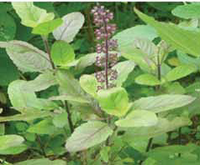
- Bengali : Tulasi
- English : Holy Basil
- Gujarati : Tulasi, Tulsi
- Hindi : Tulasi
- Kannada : Tulasi, Shree Tulasi, Vishnu Tulasi
- Malayalam : Tulasi, Tulasa
- Marathi : Tulas
- Punjabi : Tulasi
- Tamil : Tulasi, Thulasi, Thiru Theezai
- Telugu : Tulasi
- Urdu : Raihan, Tulsi
Medicinal Uses
- Intermittent fever (Vishama jwara): Administration of 10 ml Krishna tulasi leaf juice mixed with 2 gm Maricha (Pepper) powder thrice a day is beneficial.
- Cough: Consuming 10ml of Krishna tulasi leaves juice with honey, twice or thrice a day is useful in cough and cold.
- Itching rashes (Skin Allergy): External application of Tulasi leaf paste over the affected skin is useful.
- Headache: Installation of the 2 drops of tulasi fresh leaves juice in both nostrils on empty stomach daily helps to relieve sinusitis related headache.
- Wound: Regular External application of tulasi leaves and garlic fine paste over the wound will destroy the maggots in wound.
- Bad breath: chewing one or two holy basil (tulasi) leaves daily helps to relieve bad breath issue. It also improves digestion.
- Fungal infection: Take equal quantity of Basil tulasi leaves and neem leaves paste added with pinch of turmeric. Application of this paste is useful to cure the fungal infection.
Tvak
Scientific name : Cinnamomum zeylanicum,
Family : Lauraceae
Vernacular name
- Assamese : Dalcheni
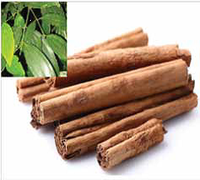
- Bengali : Daruchini, Darchini
- English : Cinnamon bark
- Gujarati : Dalchini
- Hindi : Dalchini
- Kannada : Dalchini Chakke
- Kashmiri : Dalchini, Dalchin
- Malayalam : Karuvapatta, Ilavarngathely
- Marathi : Dalchini
- Oriya : Dalechini, Guda twak
- Punjabi : Dalchini, Darchini
- Tamil : Lavangapattai, Karuvapattai
- Telugu : Lavangapatta, Dalchini chekka
- Urdu : Darchini
Medicinal Uses
- Anaemia: Mix ½ teaspoonful of cinnamon powder and two teaspoonfuls of honey in one cup of pomegranate juice and have it for a few months. It will help the anaemic patients to improve the hemoglobin.
- Memory enhancement: Every night, take half a teaspoonful of honey mixed with 3gms of powdered cinnamon. This improves memory.
- Palpitation: In cases of palpitation one should, chewed a piece of cinnamon.
- Diabetes: This is a popular spice and is a strong stimulator of insulin activity and thus extremely useful in treating diabetes. In take of ½ teaspoonful of powdered cinnamon with water daily.
- Fever: Add 3 crushed cloves, 2 cardamoms, 6‒7 basil leaves and 1 tsp of cinnamon to 2 cups of water. Boil and drink this decoction, once or twice a day.
- Insomnia: Add ½ teaspoonful of cinnamon powder and 1 teaspoonful of honey to 1 cup of warm milk. Drink before going to bed.
Tvakpatra
Scientific name : Cinnamomum tamala
Family : Lauraceae
Vernacular name
- Assamese : Tejpat, Mahpat
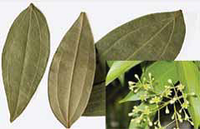
- Bengali : Tejpatra, Tejpata
- English : Indian Cinnamon
- Gujarati : Tamala patra, Develee
- Hindi : Tejpatra
- Kannada : Tamalapatra, Dalchini Ele
- Kashmiri : Dalchini pan, Tajpatra
- Malayalam : Karuvapatta patram
- Marathi : Tamalpatra
- Oriya : Tejapatra
- Punjabi : Tajpater
- Tamil : Lavangapatri
- Telugu : Akupatri
- Urdu : Tezpat
Medicinal Uses
- Dandruff: Make an infusion of Tej patta (soak 10 leaves in 50ml of hot water for 1-2 hours), add it to the shampoo and use it. It helps to treat dandruff.
- Dyslipidaemia: Consume 5gms of Bay leaves (tej patta) powder with honey daily on empty stomach in morning for 30 days. It reduce the blood glucose and cholesterol .
- Constipation: Intake of tej patta tea (Boil 3 bay leaves in 50ml of water for 5-10min) can alleviate common digestive disorders like constipation, acid reflux and irregular bowel movements
- Indigestion: 3 grams of bay leaves powder, a piece of ginger are boiled in 200 ml of water till ¼ water remains. Consume this decoction with honey twice a day. It also acts as an appetite stimulant and beneficial in indigestion.
- Clean Teeth: To get sparkling white teeth, brush teeth with powdered bay leaves once in 3 days.
- Insect Repellent: Bay leaves are a great insect repellent as they contain lauric acid. Topical application of the paste made from leaves powder and little coconut oil relieves stings and bites when applied topically
- Urinary calculi: Boil 3 grams of bay leaves, 3 cardamom in 200 ml of water till 50 ml of water remains. Strain and drink this twice daily. This will stop the formation of kidney stones.
Vacha
Scientific name : Acorus calamus
Family : Araceae
Vernacular name
- English : The Sweet Flag
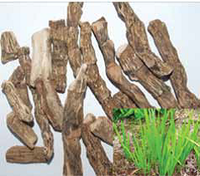
- Gujarati : Ghoduvaj, Ghodvach
- Hindi : Bach, Gora-bach
- Kannada : Baje, Narru Berua
- Malayalam : Vayambu
- Marathi : Vaca, Vekhandas
- Punjabi : Varch, Ghodavaca
- Tamil : Vasambu, Pillai maruntho
- Telugu : Vasa
- Urdu : Waja-e-Turki
Medicinal Uses
- Headache: A pinch of powder prepared from equal quantities of pippali and vacha is blown (Snuff) in each nostrils which induces sneezing and nasal discharge thereby reduce the tension headache.
- Memory and speech improvement: Regular intake of vacha (500mg) mixed with honey and ghee, early morning in empty stomach for 1 month is highly beneficial.
- Anxiety: Vacha oil has tranquilizing effect, hence regular use over the scalp will reduce the anxiety.
- Epilepsy: Vacha powder 500mg with honey administered internally twice a day is beneficial in epilepsy. During this treatment only milk diet advised for more effectiveness.
- Cough: Administration of 250mg vacha powder and 1gm of licorice powder along with honey twice a day is useful in common paediatric problems like cough, fever, pain in the abdomen etc.
- Stammering: Vacha rhizome powder, if consumed daily in the dose of 100 to 500 mg with honey is very beneficial for stammering speech and also in strengthening the nervous system. It should be noted that a dose above 1 gram may lead to vomiting.
Vasa
Scientific name : Adhatoda vasica
Family : Acanthaceae
Vernacular name
- Assamese : Titabahak, Bahak, Vachaka
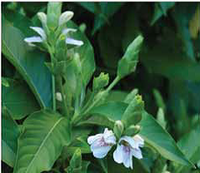
- Bengali : Baksa, Vasaka
- English : Vasaka
- Gujarati : Aduso, Ardusi, Adulso
- Hindi : Aduss, Arusa
- Kannada : Adsale, Adusoge, Atarusha, Adsole, Adasale
- Kashmiri : Vasa
- Malayalam : Attalataka m, Atalotakam
- Marathi : Vasa, Adulsa
- Oriya : Basanga
- Punjabi : Bhekar, Vansa, Arusa
- Tamil : Vasambu, Adathodai
- Telugu : Addasaramu
- Urdu : Adusa, Basa
Medicinal Uses
- Jaundice: 5ml of vasa leaves juice and 5 ml honey should be given three times daily in cases of cough, fever, bronchial asthma and jaundice.
- Bleeding piles: 20 gms of vasa leaves paste boiled in 100 ml of water till it reduced to 25ml. Internal administration of this decoction twice daily is useful to cure bloody diarrhoea, bleeding piles etc.
- Tuberculosis: Gulkand prepared from Vasa flowers is beneficial in tuberculosis.
- Joint pains: A poultice of vasa leaves applied over the swelling of joints in order to get the relief from pain.
- Menorrhagia: Internal administration of 15 ml of vasa leaves juice with jaggery twice a day is beneficial.
- Bronchial Asthma: 10ml of vasa leaves juice added with 3gms of dry ginger, 2gms of long pepper and honey is given twice daily is useful in cases of bronchial asthma, and cough.
Vatama
Scientific name :Prunus amygdalus
Family : Rosaceae
Vernacular name
- English : Almond
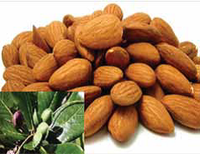
- Hindi : Badam
- Kannada : Baadaami, Badaami, Badamu
- Malayalam : Badam, Badamkotta
- Marathi : Baadaam
- Tamil : Vaadumai, Vatamkottai
- Telugu : Baadaamu
Medicinal Uses
- Memory enhancement: Soak a few almonds in water overnight and next morning peel off the thin red skin and ground it into a paste. Have one teaspoonful of this paste daily with milk before breakfast regularly for a period of three to four months will prove to be to improve the memory in children.
- Lactation: Eating four almonds in the morning that have been soaked overnight helps to improve the flow of milk.
- High Cholesterol: Almonds are highly nutritious nuts and contain monounsaturated fat, which is known to reduce cholesterol markedly reverse the altered lipid levels to normal range.
- As Rejuvenation : 5 no Almonds, 3gms Ashwagandha root, pinch of pippali root powder with Ghee followed by Sugar mixed milk , before going to bed. It also induces good sleep. This boosts the energy and provides stamina. This acts as a immune-modulator too.
- Anxiety: Inhalation of almond oil soothes nerves (goes to sinus and a part gets absorbed by nerve tissue) and reduce the anxiety.
- Dark circles and black heads: Regular application of almond oil over the lesions of black head and dark circles around the eyes will relieve the complaints very effectively. 14-21 days application brings considerable change.
- Toothache: In the case of tooth ache as well as gum diseases, burn the shells of almonds, powder, and make use of as tooth powder.
Yashtimadhu
Scientific name :Glycyrrhiza glabra
Family : Fabaceae
Vernacular name
- Assamese : Jesthimadhu, Yeshtmadhu
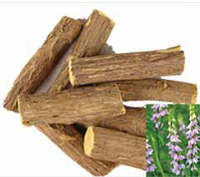
- Bengali : Yashtimadhu
- English : Liquorice root
- Gujarati : Jethimadha, Jethimard, Jethimadh
- Hindi : Mulethi, Mulathi, Muleti, Jethimadhu, Jethimadh
- Kannada : Jestamadu, Madhuka, Jyeshtamadhu, Atimadhura
- Kashmiri : Multhi
- Malayalam : Irattimadhuram
- Marathi : Jesthamadh
- Oriya : Jatimadhu, Jastimadhu
- Punjabi : Jethimadh, Mulathi
- Tamil : Athimadhuram
- Telugu : Atimadhuramu
- Urdu : Mulethi, Asl-us-sus
Medicinal Uses
- Insomnia: Consume 5gms of Yashtimadhu (licorice) root powder in 100 ml of warm milk daily night before going to bed for 30 days is good for insomnia.
- Asthma drink: Take 3gms of licorice root powder in 100ml of water and boiled like tea. Drinking this tea two to three times a day good for asthma. Yashtimadhu (Licorice) tea can also treat depression.
- Face pigmentation: Make a paste with Yashtimadhu (Licorice) powder mixed with few drops of coconut oil, Almond oil and milk. Use this pack on the face and allow it to dry. Rinse the face pack with normal water will help to keep the skin moisturized for dry skin persons.
- Gastritis: 5 gms of Yashtimadhu (Licorice) boiled in 100ml of milk and reduced it into 50ml . Internal administration of this milk twice daily relieves peptic ulcer disease, heartburn, as well as gastritis
- Menstrual cramps: Consuming Yashtimadhu (licorice) root tea every day starting three days before suspected Menstrual cycle periods of the month can help to reduce PMS symptoms and muscle cramps.
Yavani
Scientific name :Trachyspermum ammi
Family : Apiaceae
Vernacular name
- Assamese : Jain
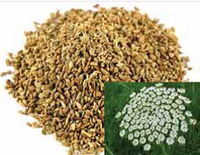
- Bengali : Yamani, Yauvan, Yavan, Javan, Yavani, Yoyana
- English : Bishopʼs weed
- Gujarati : Ajma, Ajmo, Yavan, Javain
- Hindi : Ajwain, Jevain
- Kannada : Oma, Yom, Omu
- Kashmiri : Kath
- Malayalam : Omam, Ayanodakan
- Marathi : Onva
- Oriya : Juani
- Punjabi : Lodhar
- Tamil : Omam
- Telugu : Vamu
Medicinal Uses
- Earache: 3 grams of Ajwain seeds with 5 Garlic cloves are boiled in 50 ml of sesame oil until it turns red. Filter the oil and instill 2-3 drops in the ear for earache.
- Cold: 5 grams of Ajwain seeds crush them and tie in a cloth and inhale it. Or add 10 gms of Ajwain to a bowl of boiling water and inhale the steam to relieve Nasal block
- Flatulence & Colic: 3 gms of Ajwain seed powder and 3 gms of dried Ginger powder with a little amount of Black salt are mixed and consume with warm water twice or thrice a day internally.
- Chronic bronchitis: Mix Ajwain powder with Jagger in equal quantity, heat the mixture to make a paste and take 2 teaspoonful twice a day.
- Sprains: Make paste of 10 gms of Ajwain seed powder, little salt and turmeric in gingerly oil and apply thick luke warm paste on the sprained area.
- Sore throat: 5gms of Ajwain seed powder boiled in 100ml of water. Use this water for Gargling for Sore throat.
Source: Ayurveda offering Herbal healing
Last Modified : 3/7/2020
This topic Provides Information about Guidelines f...
